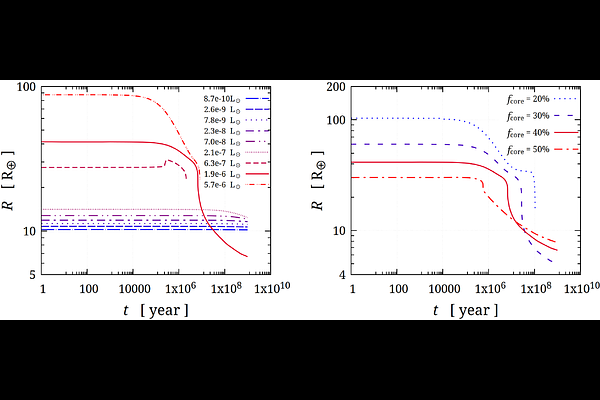The Narrow Formation Pathway of Hot Saturns: Constraints on Initial Planetary Properties

The Narrow Formation Pathway of Hot Saturns: Constraints on Initial Planetary Properties
Minghao Xie, Sheng Jin, Dong-Hong Wu
AbstractThe observed exoplanet population exhibits a scarcity of short-period Saturn-mass planets, a phenomenon referred to as the ``hot Saturn desert". This observational scarcity can be utilized to validate the theories regarding the formation and evolution of gas planets. In this study, we conduct large-scale numerical simulations to explore how the initial conditions of gas planets orbiting solar-type and M-dwarf stars influence their evolutionary trajectories in the semi-major axis versus planetary radius ($a$-$R$) parameter space. We generate a synthetic population of 10,000 short-period gaseous planets by systematically varying their initial planetary masses ($M_{\rm p}$), initial planetary luminosities ($L_{\rm p}$), initial core mass fractions ($f_{\rm core}$), and semi-major axis ($a$). Furthermore, we assume these gaseous planets have ceased orbital migration and model their long-term thermal evolution, taking into account the impacts of atmospheric evaporation. Our results show that the initial mass, $L_{\rm p}$, and $f_{\rm core}$ are the dominant factors controlling radius evolution for short-period gas planets. The key to survival as a hot Saturn analogue appears to be having just the right combination of properties after gas disk dissipation: an $M_{\rm p}$ below 0.5 Jupiter Mass ($M_{\rm Jup}$), a substantial $f_{\rm core}$ of $\geq$ 30%, and relatively low $L_{\rm p}$ on the order of $10^{-6}$ solar luminosity ($L_{\odot}$) or less. The survival criteria for hot Saturn analogs align with theoretically unfavorable initial conditions of gas planets formed via core accretion scenario, naturally explaining the observed boundaries of the hot Saturn desert.